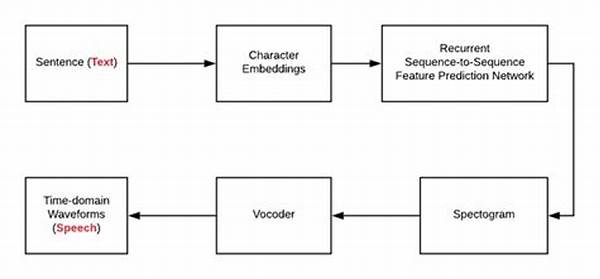In a world increasingly driven by technology, the way we communicate is undergoing a transformation that is as swift as it is groundbreaking. The advent of neural networks has propelled us into an era where text synthesis is no longer a distant dream but an everyday reality. Imagine having a personalized assistant that crafts emails just the way you would, or content created for platforms that feels both authentic and engaging. It’s not just about strings of words anymore; we’re talking about content that’s smart, human-like, and sometimes even croons a tune of creativity that you wouldn’t expect from a machine. This is the era of text synthesis using neural networks, where words come alive through artificial intelligence.
The journey to achieve this technological marvel wasn’t straightforward. Early attempts at text generation were often mechanical, producing outputs that were far from coherent or contextually relevant. Remember the old caricatures of robot speech? They were stilted, awkward, and often hilariously off-mark. But with neural networks, everything changed. These powerful algorithms enabled machines to learn from vast datasets, absorbing not just grammar and vocabulary but also nuances in tone, emotion, and context.
A New Era of Text Synthesis
As neural networks became more sophisticated, so did their ability to understand the intricacies of human language. Today, these technologies are not just about churning out content—they are redefining the possibilities of how content is created, personalized, and consumed. Whether it’s creating realistic chatbots that carry meaningful conversations or generating poetry that tugs at your heartstrings, text synthesis using neural networks is making it happen.
In addition to transforming everyday communication, businesses worldwide are harnessing this technology for marketing, customer service, and beyond. Companies are creating personalized experiences for their customers through AI-powered tools that engage and interact in real-time. With predictive text and smart reply options, neural networks have ingrained themselves in our day-to-day lives without us even noticing it half the time.
Harnessing the Power of Neural Networks
As the technology continues to advance, the potential applications of text synthesis using neural networks are vast and varied. From creative writing to technical documentation, the scope of work that these algorithms can assist with is staggering. Imagine a world where press releases are churned out by machines yet still manage to capture the essence of a corporate message effectively. Or where novels are co-authored by humans and machines, transcending the conventional limits of creativity.
The future shines brightly as the capabilities of neural networks expand, creating opportunities that we are only beginning to explore. So whether you are a content creator, marketer, or simply a tech enthusiast, the era of intelligent text synthesis beckons you to imagine, innovate, and inspire. The world of possibilities is endless with text synthesis using neural networks.
The Science Behind Text Synthesis Using Neural Networks
Understanding the science that powers text synthesis using neural networks unveils a fascinating tapestry of algorithms and machine learning principles. One of the core components is the neural network itself, which emulates the way a human brain processes information. Through layered learning and pattern recognition, neural networks can predict and construct meaningful sentences. Text synthesis using neural networks typically involves Recurrent Neural Networks (RNNs) or their more complex counterpart, the Transformer models.
These models are fed large volumes of text data, learning the structure, context, grammar, and even the subtleties of humor and tone. This data-driven approach allows machines to recreate text with a high degree of fluency and coherence. Some models can even generate text in multiple languages, opening up a new frontier in global communications.
Applications and Innovations
With the continuous evolution of text synthesis using neural networks, industries are witnessing significant enhancements in operational efficiency. From automated report generation to realistic conversational interfaces, the applications are manifold.
Examples of Text Synthesis Using Neural Networks
Here are some practical examples where text synthesis using neural networks comes into play:
Each of these examples highlights the versatility of text synthesis using neural networks, shaping the next generation of content creation in diverse fields.
A New Chapter in Technology
The dynamic and continually evolving field of text synthesis using neural networks is far from hitting its peak. Innovations in this space are not just about automation—they’re about enhancing human creativity and productivity. As more data becomes available and models become smarter, we can expect even closer collaboration between humans and machines in the creative processes. This intersection of technology and creativity is an exciting narrative, one that’s being written one word at a time.
Embrace the future and explore the possibilities that text synthesis using neural networks has to offer. Whether you’re fascinated by technology’s potential or intrigued by its upcoming innovations, this field offers a magnetic draw toward what lies ahead. Don’t just be a spectator; be a part of the technological evolution.
Illustrations of Text Synthesis Using Neural Networks
Explore a visual journey through the various applications of text synthesis using neural networks:
Engage with these illustrations to comprehend the profound impact that text synthesis using neural networks is poised to deliver across multiple sectors, influencing everything from daily interactions to strategic business initiatives.
Powering the Future with AI
As you delve deeper into the realm of text synthesis using neural networks, remember that this technology is not merely a trend—it’s reshaping the landscape of communication and creativity. Be it through writing, marketing, or real-time dialogue, neural networks are your allies in driving innovative ideas and smart solutions. Let this inspiring journey into text synthesis be the gateway to your next technological breakthrough, paving the way for smarter, more effective communication in an ever-connected world.

